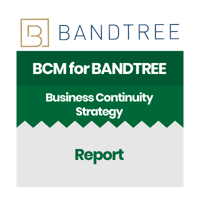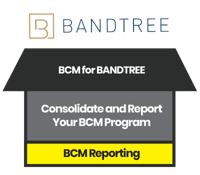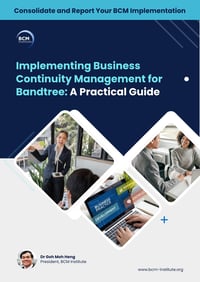Business Continuity Strategies for Bandtree
Summary for Management Approval
 This Business Continuity Strategy (BCS) Report consolidates the outcomes of the BCS exercise for the eight identified Critical Business Functions (CBFs).
This Business Continuity Strategy (BCS) Report consolidates the outcomes of the BCS exercise for the eight identified Critical Business Functions (CBFs).
Its purpose is to provide management with a clear, concise, and actionable blueprint for mitigating, recovering, and sustaining essential operations in the event of a disaster or significant disruption.
The document is organised into three core parts:
- Mitigation Strategies and Justification — proactive measures to reduce risk exposure and residual impact
- Recovery Strategies — tailored plans to restore operations within acceptable timeframes
- Minimum Resources Required During a Disaster — identification of essential personnel, equipment, and facilities during disruption
Management’s approval is sought to formalise these strategies, allocate necessary resources, and integrate them into the broader Business Continuity Management (BCM) governance framework.
[P1] Mitigation Strategies and Justification
 |
![[BCM] [BT] [E4] [BCS] [P1] Mitigation Strategies and Justification](https://no-cache.hubspot.com/cta/default/3893111/0facf3c4-0e59-41d3-ad61-3445b12a1cbb.png) |
[P2] Recovery Strategies for CBF-1 to CBF-8
This section examines the development and selection of suitable recovery strategies for each Critical Business Function (CBF) and its associated sub-processes (Sub-CBF).
Drawing on established best practices and aligned with BCM standards, such as ISO 22301, and guidance from BCM Institute guidance notes, this outlines how organisations can determine, document, and justify recovery approaches that are both practical and cost-effective.
Emphasis is placed on ensuring strategies are not only technically viable but also logistically executable during a crisis or disaster scenario.
This is a comprehensive table for CBF-1 to CBF-8 for Bandtree, incorporating RTO, recovery strategies, locations, details, and justifications based on BCM Institute’s guidance note.
[P3] Minimum Resources Required During a Disaster for CBF-1 to CBF-8
This section outlines the baseline requirements for recovering and maintaining each critical business function (CBF), with a specific focus on CBFs 1-8.
It includes detailed resource needs such as personnel, workspace, communication tools, computing devices, and other functional tools or systems necessary to sustain operations at designated recovery locations.
This structured approach ensures that Bandtree is adequately prepared to resume critical operations in a timely and efficient manner following a disruption.
 In summary, this BCS Report offers a well-grounded and pragmatic set of strategies:
In summary, this BCS Report offers a well-grounded and pragmatic set of strategies:
- Mitigation minimises exposure before incidents occur
- Recovery ensures the structured restoration of operations
- Resource planning ensures preparedness for staffing, infrastructure, and logistics
To move forward, I recommend the following actions by management:
- Approve the proposed strategies and resource allocations as part of the official BCM framework.
- Allocate budget and resources (capex & opex) to implement mitigation enhancements, redundant infrastructure, cloud services, alternate sites, and workforce training.
- Embed the BCS into governance and oversight (e.g. assign accountability, integrate with risk management, schedule reviews).
- Conduct periodic testing and exercises (tabletop drills, failover tests) to validate assumptions, refine recovery workflows, and adjust resource needs.
- Maintain ongoing monitoring and updates — as business operations, technology, threat vectors, and regulatory requirements evolve, the BCS must evolve too.
With management’s endorsement and resourcing, this BCS forms the foundation for a resilient operational posture — capable of withstanding disruptions and preserving continuity of our eight critical business functions, thus protecting revenue, reputation, compliance, and stakeholder trust.
More Information About Business Continuity Management Courses
To learn more about the course and schedule, click the buttons below for the BCM-300 Business Continuity Management Implementer [BCM-3] and the BCM-5000 Business Continuity Management Expert Implementer [BCM-5].







![[BCM] [BT] [E4] [BCS] [P2] Recovery Strategies](https://no-cache.hubspot.com/cta/default/3893111/cf1f680a-1e53-43b9-a98d-a537ea22199f.png)

![[BCM] [BT] [E4] [BCS] [P3] Minimum Resources Required During a Disaster](https://no-cache.hubspot.com/cta/default/3893111/022230a1-5a08-414c-ba03-566b247d4cee.png)



![Register [BL-B-3]*](https://no-cache.hubspot.com/cta/default/3893111/ac6cf073-4cdd-4541-91ed-889f731d5076.png)



![FAQ [BL-B-3]](https://no-cache.hubspot.com/cta/default/3893111/b3824ba1-7aa1-4eb6-bef8-94f57121c5ae.png)
![Email to Sales Team [BCM Institute]](https://no-cache.hubspot.com/cta/default/3893111/3c53daeb-2836-4843-b0e0-645baee2ab9e.png)





